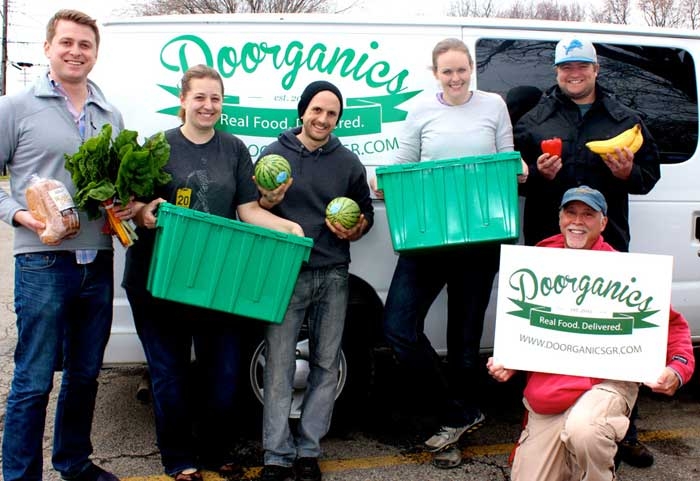In the past few years, Community Supported Agriculture (CSAs) and organic food delivery services have recently seen significant expansion in their food-conscious customer base. These options are alternatives to food and produce with GMOs (genetically modified organisms) and pesticides added, resulting in healthier and fresher options.
The concept of CSA farms is to offer full or half shares to customers. What this gets you is a certain amount of the farm’s harvest, which you can pick up weekly, bi-weekly or monthly. Most of these farms offer organic produce farmed sustainably from June through October. Chimney Creek Farm (12101 7 Mile Rd. NE, Belding) opened in 2010 with 15 shareholders, and has seen a steady increase in customers every year since, expecting over 100 this year. Farmer Deane Brengle says that their vegetables are doubling every year, and they are seeing more interest in meat, eggs, fruit, and jelly. He believes that the rising interest in CSAs is caused by an increased awareness about where food comes from.
“People are more aware of what’s in food and where it comes from. They’re interested in the story of their food, where it comes from, how it was grown,” Brengle said.
Chimney Creek practices sustainable farming with natural soil amendments, cover crops, compost, and manure fertilizer. They do not use pesticides, GMOs, herbicides, chemical fertilizers, steroids, growth hormones, or antibiotics. While the food might not be as pretty as it is at the grocery store, it’s much better for taste buds and body. The farmers at Chimney Creek encourage their shareholders to come out to the farm and see what they’re investing in. Full shares are $32.50 a week for 18 weeks and half shares are $39.50 a week for nine weeks, with delivery available to the metro Grand Rapids area, including Rockford and Lowell. Brengle’s advice to food lovers everywhere is simple: “Know your farmer and know the story of your food.”
The demand for local, organic food has expanded beyond CSAs, too. Doorganics (353 Fuller St. NE 200, Grand Rapids) delivers bins of locally grown produce to your door weekly or bi-weekly. It offers three different bin sizes, which range from $29-$49. The company has also seen significant expansion recently.
“Doorganics has been expanding in many different ways," said Owner Mike Hughes. "Our customer base continues to grow, which creates great service and product enhancements. We are being contacted by new farmers, artisans and local food makers everyday. Our list of farm partners continues to expand. We now offer a wide variety of local meat, baked goods, cheeses and other specialty items that complement the organic and local (when in season) produce. We've also expanded our delivery area from Grand Rapids to Holland and Hudsonville.”
Doorganics tries to include as much locally grown produce as possible year round, utilizing local greenhouses in the off-seasons. While this type of service is not as intimate as a CSA, where you get to put a face to your farmer, it is more convenient.
“It's not always easy to find a good mix of local and organic food," Hughes said. "We make it easy and convenient by allowing our customers to sign up, shop online and have real food delivered to their home or workplace.”
With both Doorganics and Chimney Creek Farm, customers can put their minds at ease while munching on local, healthy, organic treats.
There are many other CSAs in West Michigan, including The Blandford Farm (1715 Hillburn Ave. NW, Grand Rapids), a 2.5-acre farm on Blandford Nature Center, Urban Farm (1226 Union NE, Grand Rapids), part of Creston’s New City Neighbors project, Groundswell Farm (6527 Quincy St., Zeeland) and The Green Wagon (4960 Quiggle Ave., Ada). All of these farms either accept EBT or give discounts to those who receive food stamps. Urban Farm employs local high school students in order to teach them about sustainable farming, as well as how to run a business. It also offers full, half and quarter shares. Groundswell Farm donates produce left over after farmers markets to local charities like Holland Rescue Mission, Well House and Mel Trotter. The company also hosts educational farm tours and partners with Black River Schools to teach kids about food and sustainable farming.





